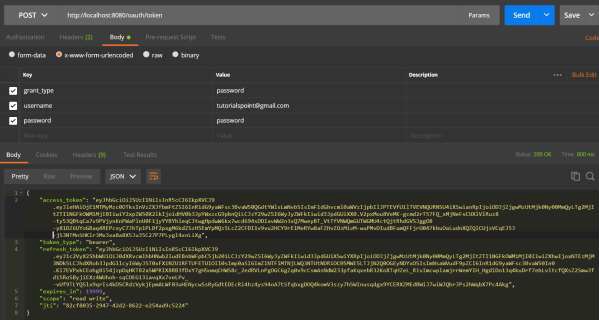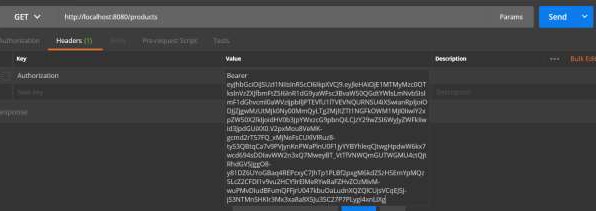- Spring Boot-Google OAuth2登录
- Spring Boot-Google OAuth2登录(1)
- url 编码不工作 Spring Boot oauth2 - Java (1)
- url 编码不工作 Spring Boot oauth2 - Java 代码示例
- spring boot - CSS (1)
- Spring Boot属性
- Spring Boot属性(1)
- Spring 和 Spring Boot 的区别(1)
- Spring 和 Spring Boot 的区别
- 使用 Spring 和 Github 进行 OAuth2 身份验证
- 从 jwt 令牌请求 Spring Boot 中获取用户名 - Java (1)
- 从 jwt 令牌请求 Spring Boot 中获取用户名 - Java 代码示例
- spring boot - CSS 代码示例
- Spring和Spring Boot之间的区别
- Spring和Spring Boot之间的区别(1)
- Spring Boot应用程序
- Spring Boot应用程序(1)
- Spring Boot版本
- Spring Boot版本(1)
- Spring Boot教程
- Spring Boot教程(1)
- 什么是 Spring Boot - Java (1)
- Spring Boot-简介
- Spring Boot-简介(1)
- Spring Boot 简介
- Spring Boot 简介(1)
- Spring Cloud与Spring Boot(1)
- Spring Cloud与Spring Boot
- 讨论Spring Boot(1)
📅 最后修改于: 2020-11-11 05:58:39 🧑 作者: Mango
在本章中,您将详细了解Spring Boot Security机制和带有JWT的OAuth2。
授权服务器
授权服务器是Web API安全性的最高架构组件。授权服务器充当一个集中授权点,该授权点使您的应用程序和HTTP端点可以识别应用程序的功能。
资源服务器
资源服务器是一个向客户端提供访问令牌以访问资源服务器HTTP端点的应用程序。它是包含HTTP端点,静态资源和动态网页的库的集合。
OAuth2
OAuth2是一个授权框架,使应用程序Web Security可以从客户端访问资源。要构建OAuth2应用程序,我们需要关注授予类型(授权代码),客户端ID和客户端密码。
JWT令牌
JWT令牌是JSON Web令牌,用于表示两方之间获得担保的索赔。您可以在www.jwt.io/上了解有关JWT令牌的更多信息。
现在,我们将构建一个OAuth2应用程序,该应用程序可以借助JWT令牌来使用授权服务器,资源服务器。
您可以使用以下步骤通过访问数据库来使用JWT令牌实现Spring Boot Security。
首先,我们需要在构建配置文件中添加以下依赖项。
Maven用户可以在pom.xml文件中添加以下依赖项。
org.springframework.boot
spring-boot-starter-jdbc
org.springframework.boot
spring-boot-starter-security
org.springframework.boot
spring-boot-starter-web
org.springframework.security.oauth
spring-security-oauth2
org.springframework.security
spring-security-jwt
com.h2database
h2
org.springframework.boot
spring-boot-starter-test
test
org.springframework.security
spring-security-test
test
Gradle用户可以在build.gradle文件中添加以下依赖项。
compile('org.springframework.boot:spring-boot-starter-security')
compile('org.springframework.boot:spring-boot-starter-web')
testCompile('org.springframework.boot:spring-boot-starter-test')
testCompile('org.springframework.security:spring-security-test')
compile("org.springframework.security.oauth:spring-security-oauth2")
compile('org.springframework.security:spring-security-jwt')
compile("org.springframework.boot:spring-boot-starter-jdbc")
compile("com.h2database:h2:1.4.191")
哪里,
-
Spring Boot Starter Security-实现Spring Security
-
Spring Security OAuth2-实现OAUTH2结构以启用授权服务器和资源服务器。
-
Spring Security JWT-为Web安全性生成JWT令牌
-
Spring Boot Starter JDBC-访问数据库以确保用户可用。
-
Spring Boot Starter Web-编写HTTP端点。
-
H2数据库-存储用于身份验证和授权的用户信息。
完整的构建配置文件如下所示。
4.0.0
com.tutorialspoint
websecurityapp
0.0.1-SNAPSHOT
jar
websecurityapp
Demo project for Spring Boot
org.springframework.boot
spring-boot-starter-parent
1.5.9.RELEASE
UTF-8
UTF-8
1.8
org.springframework.boot
spring-boot-starter-jdbc
org.springframework.boot
spring-boot-starter-security
org.springframework.boot
spring-boot-starter-web
org.springframework.security.oauth
spring-security-oauth2
org.springframework.security
spring-security-jwt
com.h2database
h2
org.springframework.boot
spring-boot-starter-test
test
org.springframework.security
spring-security-test
test
org.springframework.boot
spring-boot-maven-plugin
Gradle – build.gradle
buildscript {
ext {
springBootVersion = '1.5.9.RELEASE'
}
repositories {
mavenCentral()
}
dependencies {
classpath("org.springframework.boot:spring-boot-gradle-plugin:${springBootVersion}")
}
}
apply plugin: 'java'
apply plugin: 'eclipse'
apply plugin: 'org.springframework.boot'
group = 'com.tutorialspoint'
version = '0.0.1-SNAPSHOT'
sourceCompatibility = 1.8
repositories {
mavenCentral()
}
dependencies {
compile('org.springframework.boot:spring-boot-starter-security')
compile('org.springframework.boot:spring-boot-starter-web')
testCompile('org.springframework.boot:spring-boot-starter-test')
testCompile('org.springframework.security:spring-security-test')
compile("org.springframework.security.oauth:spring-security-oauth2")
compile('org.springframework.security:spring-security-jwt')
compile("org.springframework.boot:spring-boot-starter-jdbc")
compile("com.h2database:h2:1.4.191")
}
现在,在主Spring Boot应用程序中,添加@EnableAuthorizationServer和@EnableResourceServer批注,以在同一应用程序中充当Auth服务器和Resource Server。
另外,您可以使用以下代码编写简单的HTTP端点,以使用JWT令牌通过Spring Security访问API。
package com.tutorialspoint.websecurityapp;
import org.springframework.boot.SpringApplication;
import org.springframework.boot.autoconfigure.SpringBootApplication;
import org.springframework.security.oauth2.config.annotation.web.configuration.EnableAuthorizationServer;
import org.springframework.security.oauth2.config.annotation.web.configuration.EnableResourceServer;
import org.springframework.web.bind.annotation.RequestMapping;
import org.springframework.web.bind.annotation.RestController;
@SpringBootApplication
@EnableAuthorizationServer
@EnableResourceServer
@RestController
public class WebsecurityappApplication {
public static void main(String[] args) {
SpringApplication.run(WebsecurityappApplication.class, args);
}
@RequestMapping(value = "/products")
public String getProductName() {
return "Honey";
}
}
使用以下代码定义POJO类以存储用于身份验证的用户信息。
package com.tutorialspoint.websecurityapp;
import java.util.ArrayList;
import java.util.Collection;
import org.springframework.security.core.GrantedAuthority;
public class UserEntity {
private String username;
private String password;
private Collection grantedAuthoritiesList = new ArrayList<>();
public String getPassword() {
return password;
}
public void setPassword(String password) {
this.password = password;
}
public Collection getGrantedAuthoritiesList() {
return grantedAuthoritiesList;
}
public void setGrantedAuthoritiesList(Collection grantedAuthoritiesList) {
this.grantedAuthoritiesList = grantedAuthoritiesList;
}
public String getUsername() {
return username;
}
public void setUsername(String username) {
this.username = username;
}
}
现在,使用以下代码并定义CustomUser类,该类扩展了org.springframework.security.core.userdetails.User类以用于Spring Boot身份验证。
package com.tutorialspoint.websecurityapp;
import org.springframework.security.core.userdetails.User;
public class CustomUser extends User {
private static final long serialVersionUID = 1L;
public CustomUser(UserEntity user) {
super(user.getUsername(), user.getPassword(), user.getGrantedAuthoritiesList());
}
}
您可以创建@Repository类以从数据库中读取用户信息,并将其发送到自定义用户服务,还可以添加授予的权限“ ROLE_SYSTEMADMIN”。
package com.tutorialspoint.websecurityapp;
import java.sql.ResultSet;
import java.util.ArrayList;
import java.util.Collection;
import java.util.List;
import org.springframework.beans.factory.annotation.Autowired;
import org.springframework.jdbc.core.JdbcTemplate;
import org.springframework.security.core.GrantedAuthority;
import org.springframework.security.core.authority.SimpleGrantedAuthority;
import org.springframework.stereotype.Repository;
@Repository
public class OAuthDao {
@Autowired
private JdbcTemplate jdbcTemplate;
public UserEntity getUserDetails(String username) {
Collection grantedAuthoritiesList = new ArrayList<>();
String userSQLQuery = "SELECT * FROM USERS WHERE USERNAME=?";
List list = jdbcTemplate.query(userSQLQuery, new String[] { username },
(ResultSet rs, int rowNum) -> {
UserEntity user = new UserEntity();
user.setUsername(username);
user.setPassword(rs.getString("PASSWORD"));
return user;
});
if (list.size() > 0) {
GrantedAuthority grantedAuthority = new SimpleGrantedAuthority("ROLE_SYSTEMADMIN");
grantedAuthoritiesList.add(grantedAuthority);
list.get(0).setGrantedAuthoritiesList(grantedAuthoritiesList);
return list.get(0);
}
return null;
}
}
您可以创建一个自定义用户详细信息服务类,该类扩展了org.springframework.security.core.userdetails.UserDetailsService来调用DAO存储库类,如图所示。
package com.tutorialspoint.websecurityapp;
import org.springframework.beans.factory.annotation.Autowired;
import org.springframework.security.core.userdetails.UserDetailsService;
import org.springframework.security.core.userdetails.UsernameNotFoundException;
import org.springframework.stereotype.Service;
@Service
public class CustomDetailsService implements UserDetailsService {
@Autowired
OAuthDao oauthDao;
@Override
public CustomUser loadUserByUsername(final String username) throws UsernameNotFoundException {
UserEntity userEntity = null;
try {
userEntity = oauthDao.getUserDetails(username);
CustomUser customUser = new CustomUser(userEntity);
return customUser;
} catch (Exception e) {
e.printStackTrace();
throw new UsernameNotFoundException("User " + username + " was not found in the database");
}
}
}
接下来,创建一个@configuration类以启用Web安全性,定义密码编码器(BCryptPasswordEncoder),并定义AuthenticationManager bean。安全配置类应扩展WebSecurityConfigurerAdapter类。
package com.tutorialspoint.websecurityapp;
import org.springframework.beans.factory.annotation.Autowired;
import org.springframework.context.annotation.Bean;
import org.springframework.context.annotation.Configuration;
import org.springframework.security.authentication.AuthenticationManager;
import org.springframework.security.config.annotation.authentication.builders.AuthenticationManagerBuilder;
import org.springframework.security.config.annotation.method.configuration.EnableGlobalMethodSecurity;
import org.springframework.security.config.annotation.web.builders.HttpSecurity;
import org.springframework.security.config.annotation.web.builders.WebSecurity;
import org.springframework.security.config.annotation.web.configuration.EnableWebSecurity;
import org.springframework.security.config.annotation.web.configuration.WebSecurityConfigurerAdapter;
import org.springframework.security.config.http.SessionCreationPolicy;
import org.springframework.security.crypto.bcrypt.BCryptPasswordEncoder;
import org.springframework.security.crypto.password.PasswordEncoder;
@Configuration
@EnableWebSecurity
@EnableGlobalMethodSecurity(prePostEnabled = true)
public class SecurityConfiguration extends WebSecurityConfigurerAdapter {
@Autowired
private CustomDetailsService customDetailsService;
@Bean
public PasswordEncoder encoder() {
return new BCryptPasswordEncoder();
}
@Override
@Autowired
protected void configure(AuthenticationManagerBuilder auth) throws Exception {
auth.userDetailsService(customDetailsService).passwordEncoder(encoder());
}
@Override
protected void configure(HttpSecurity http) throws Exception {
http.authorizeRequests().anyRequest().authenticated().and().sessionManagement()
.sessionCreationPolicy(SessionCreationPolicy.NEVER);
}
@Override
public void configure(WebSecurity web) throws Exception {
web.ignoring();
}
@Override
@Bean
public AuthenticationManager authenticationManagerBean() throws Exception {
return super.authenticationManagerBean();
}
}
现在,定义OAuth2配置类以添加客户端ID,客户端机密,为令牌签名者密钥和验证者密钥定义JwtAccessTokenConverter,私钥和公钥,并使用范围为令牌有效性配置ClientDetailsServiceConfigurer。
package com.tutorialspoint.websecurityapp;
import org.springframework.beans.factory.annotation.Autowired;
import org.springframework.beans.factory.annotation.Qualifier;
import org.springframework.context.annotation.Bean;
import org.springframework.context.annotation.Configuration;
import org.springframework.security.authentication.AuthenticationManager;
import org.springframework.security.oauth2.config.annotation.configurers.ClientDetailsServiceConfigurer;
import org.springframework.security.oauth2.config.annotation.web.configuration.AuthorizationServerConfigurerAdapter;
import org.springframework.security.oauth2.config.annotation.web.configurers.AuthorizationServerEndpointsConfigurer;
import org.springframework.security.oauth2.config.annotation.web.configurers.AuthorizationServerSecurityConfigurer;
import org.springframework.security.oauth2.provider.token.store.JwtAccessTokenConverter;
import org.springframework.security.oauth2.provider.token.store.JwtTokenStore;
@Configuration
public class OAuth2Config extends AuthorizationServerConfigurerAdapter {
private String clientid = "tutorialspoint";
private String clientSecret = "my-secret-key";
private String privateKey = "private key";
private String publicKey = "public key";
@Autowired
@Qualifier("authenticationManagerBean")
private AuthenticationManager authenticationManager;
@Bean
public JwtAccessTokenConverter tokenEnhancer() {
JwtAccessTokenConverter converter = new JwtAccessTokenConverter();
converter.setSigningKey(privateKey);
converter.setVerifierKey(publicKey);
return converter;
}
@Bean
public JwtTokenStore tokenStore() {
return new JwtTokenStore(tokenEnhancer());
}
@Override
public void configure(AuthorizationServerEndpointsConfigurer endpoints) throws Exception {
endpoints.authenticationManager(authenticationManager).tokenStore(tokenStore())
.accessTokenConverter(tokenEnhancer());
}
@Override
public void configure(AuthorizationServerSecurityConfigurer security) throws Exception {
security.tokenKeyAccess("permitAll()").checkTokenAccess("isAuthenticated()");
}
@Override
public void configure(ClientDetailsServiceConfigurer clients) throws Exception {
clients.inMemory().withClient(clientid).secret(clientSecret).scopes("read", "write")
.authorizedGrantTypes("password", "refresh_token").accessTokenValiditySeconds(20000)
.refreshTokenValiditySeconds(20000);
}
}
现在,使用openssl创建私钥和公钥。
您可以使用以下命令来生成私钥。
openssl genrsa -out jwt.pem 2048
openssl rsa -in jwt.pem
您可以使用要生成公共密钥,请使用以下命令。
openssl rsa -in jwt.pem -pubout
对于1.5版以上的Spring Boot版本,在application.properties文件中添加以下属性,以定义OAuth2资源过滤器顺序。
security.oauth2.resource.filter-order=3
YAML文件用户可以在YAML文件中添加以下属性。
security:
oauth2:
resource:
filter-order: 3
现在,在类路径资源src / main / resources / directory下创建schema.sql和data.sql文件,以将应用程序连接到H2数据库。
schema.sql文件如下所示:
CREATE TABLE USERS (ID INT PRIMARY KEY, USERNAME VARCHAR(45), PASSWORD VARCHAR(60));
data.sql文件如下所示:
INSERT INTO USERS (ID, USERNAME,PASSWORD) VALUES (
1, 'tutorialspoint@gmail.com','$2a$08$fL7u5xcvsZl78su29x1ti.dxI.9rYO8t0q5wk2ROJ.1cdR53bmaVG');
INSERT INTO USERS (ID, USERNAME,PASSWORD) VALUES (
2, 'myemail@gmail.com','$2a$08$fL7u5xcvsZl78su29x1ti.dxI.9rYO8t0q5wk2ROJ.1cdR53bmaVG');
注–密码应以Bcrypt编码器的格式存储在数据库表中。
您可以创建一个可执行的JAR文件,并使用以下Maven或Gradle命令运行Spring Boot应用程序。
对于Maven,您可以使用下面给出的命令-
mvn clean install
在“ BUILD SUCCESS”之后,您可以在目标目录下找到JAR文件。
对于Gradle,您可以使用如下所示的命令-
gradle clean build
在“ BUILD SUCCESSFUL”之后,您可以在build / libs目录下找到JAR文件。
现在,使用此处显示的命令运行JAR文件-
java –jar
该应用程序在Tomcat端口8080上启动。

现在,通过POSTMAN进入POST方法的URL以获取OAUTH2令牌。
http:// localhost:8080 / oauth / token
现在,添加请求标头,如下所示:
-
授权-使用您的客户ID和客户机密的基本身份验证。
-
内容类型-application / x-www-form-urlencoded

现在,添加请求参数,如下所示:
- grant_type =密码
- 用户名=您的用户名
- 密码=您的密码

现在,点击API并获得access_token,如下所示:

现在,如图所示,在Request Header中单击带有Bearer访问令牌的Resource Server API。

然后您可以看到如下所示的输出-
